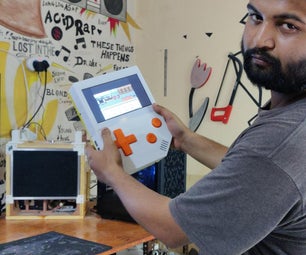Introduction: Telepresence Robot: Basic Platform (Part 2)
The second part of the telepresence robot platform consists of a motorized selfie stick that is able to rotate a phone up and down. This will ultimately give the viewer on the other end some ability to control where the camera on the phone is pointed.
To make this work, a standard servo is attached to the selfie stick. Rods extending from the servo horn are attached to the bracket which is holding the phone. When the servo horn rotates, the phone holder rotates to mirror this motion. This allows the phone to be tilted up and down. It is a very simple and effective mechanism.
This is the second part of a seven-part instructables series. Over the next two instructables we will be building the basic electromechanical robot platform. This platform will later be enhanced with sensors and additional control electronics.
To learn more about the topics covered in this series of projects check out the Robot Class, Electronics Class, and Arduino Class.
Step 1: Materials
Once again, the full parts list is specified in the previous instructable.
Here are are the parts you will need to continue building the second half of this project:
(x1) Standard servo
(x1) Selfie stick
(x1) 1/2" ceiling plate flange
(x1) Metal coat hanger
(x1) Assorted zip ties
Step 2: Separate
Remove the phone holder from the selfie stick by unscrewing it.
If your selfie stick does not have a phone holder that unscrews, you can probably just skip this step. It just makes it easier to work with if they are seperate.
Step 3: Drill
Drill 1/8" holes on center slightly above and below the attachment threading for the phone holder. These will be used to zip tie the phone holder to the ceiling plate flange.
Step 4:
Line up the center threading on the phone holder with the center hole in the ceiling plate flange. Mark the two 1/8" holes from the phone holder onto the surface of the ceiling plate flange.
Next, mark along the outside edge of the phone holder just to the left and to the right of the 1/8" holes. These will be used for zip tying the phone holder to the ceiling plate flange.
Drill all six of these markings with 1/8" drill bits.
Also, you may notice my bright orange reflection in the ceiling plate flange. I bring this up not to discuss my questionable fashion choices, but to take a moment to discuss project documentation. When I work I document everything I do and have setup my workspace to assist in doing so. You can see the two camera strobes which are those floating UFOs to the left and right of me.
While you don't need a fancy photography setup like I have to simply document your progress, I highly encourage you to document your work as you go for two reasons. First, in a few months you likely won't remember what you did or why. Having a record for yourself will make it easier to repair or replicate your work. Secondly, documenting and sharing your process helps others learn and advance. In turn, you can learn and advance from their advancements. Everyone wins - all the time.
Step 5: Attach
Insert two zip ties through each of the center holes in the backside of the ceiling plate flange. Continue to pass these through the adjacent 1/8" holes in the phone holder.
Loop the zip tie tails around and pass one through each of the adjacent ceiling plate flange outer drill holes. Firmly fasten the zip ties to attach the phone holder together with the ceiling plate flange. Trim away the excess plastic.
Step 6: Drill Two More Holes
Drill two 3/32" holes on center along the outside edge of the ceiling plate flange perpendicular to the phone holder.
For instance, if you were to draw a cross along the surface of the ceiling plate flange, the phone holder would be positioned along one line, and these holes would be the outer points of the other line.
Step 7: Drill the Servo Horn
Widen outer mounting holes on opposite ends of the servo horn by 3/32".
Step 8: Trim the Servo Horn
Cut away any extra arms on the servo horn with cutting pliers. In other words, if you did not widen any of the holes on the arm, then it is extra and should be removed from the hub.
Step 9: Extend
Fully extend the telescoping arm of the selfie stick if you have not done so already.
Step 10: Mark and Drill
At the base of the outermost segment of the selfie stick, position the servo motor.
Make a mark on the selfie stick to indicate where each set of mounting holes are on the servo. These will be used for drilling holes clear through the selfie stick to mount the servo.
Since the selfie stick tube is round, you will likely want a drilling guide to make sure your holes are on center. In order to accomplish this, place a mini screwdriver tip on the center of the markings and gently tap down with a hammer. This should create a slight indent in the tube.
Finally, use each indent as a drilling guide to make 1/8" holes clear through the tube.
Step 11: Attach
Using the holes that were just drilled and the mounting holes on the servo, zip tie the motor to the extended tube of the selfie stick.
Extend the zip ties if necessary, and trim away any excess plastic tails.
Step 12: Reattch
Twist the phone holder back onto the end of the selfie stick (if removed).
Step 13: Metal Rods
Take a metal coat hanger and using diagonal cutting pliers, create two 8" straight metal rods.
Step 14: Bend the Rods
Take a pair of pliers and bend one end of each of the rods 90 degrees to form an "L" shape.
Insert a bent end into each of the widened holes in the servo horn. Place the other end of the rod along the corresponding edge of the ceiling flange plate.
Mark the rod where it aligns with the 3/32" hole drilled in the edge of the ceiling flange plate.
Remove the rods from the servo, and again using pliers, make another 90 degree bend where the second markings are.
Step 15: Attach the Rods
Insert the bent rod ends through the servo mounting holes and the ceiling flange plate holes respectively.
Again, use the pliers to fold the ends of the rods back towards themselves to lock them in place.
Try manually rotating the servo horn back and forth. It should turn the phone holder unobstructed. If the ends of the rods happen to collide with anything that prevents it from rotating, bend them further inwards or trim them away with diagonal cutting pliers.
Step 16: More Mounting Holes
Position the handle of the selfie stick upright on the side of the plastic box, towards the front. In case you were wondering, the front side of the box is the side opposite of where the batteries and Arduino are mounted.
Make a mark on each side of the selfie stick towards the top and bottom of the plastic box. These will be used to zip tie the selfie stick to the box.
Drill these markings with a 3/16" drill bit.
Step 17: Attach
Using the holes drilled in the box, firmly attach the selfie stick to the plastic box with zip ties.
For the sake of tidyness, once again, trim away any excess plastic bits.
Step 18: Pass-Through Hole
Drill a 3/8" hole in the top of the plastic box near the Arduino to pass the servo motor wire connector through.
Note that you may want to start with a smaller size and gradually widen the hole. When I simply 'went for it' using a 3/8" drill bit, the plastic box cracked a little.
Step 19: Wire It Up
Pass the servo's connector through the top of the box, and then open the box up.
Plug the remaining 6V and ground wires into the servo motor's respective power and ground sockets. Attach a 4" solid core green wire between the motor's signal socket (i.e. white wire) and digital pin 5 on the Arduino.
Step 20: Program
Reprogram the Arduino with the following code to test the rotating phone holder:

Once you are sure that is working, you can also upload this code which controls both the drive wheel and the phone holder simultaneously:
https://cdn.instructables.com/F9L/TKND/IN0TI4X7/F9LTKNDIN0TI4X7.LARGE.gifStep 21: Case Closed
After you are sure everything is working correctly, close the case up.
Step 22: Insert Your Phone
If you are confident of your work and are feeling brave, insert your phone into the phone holder and prepare to be amazed!**
**Assuming you are easily amused...








![Tim's Mechanical Spider Leg [LU9685-20CU]](https://content.instructables.com/FFB/5R4I/LVKZ6G6R/FFB5R4ILVKZ6G6R.png?auto=webp&crop=1.2%3A1&frame=1&width=306)




